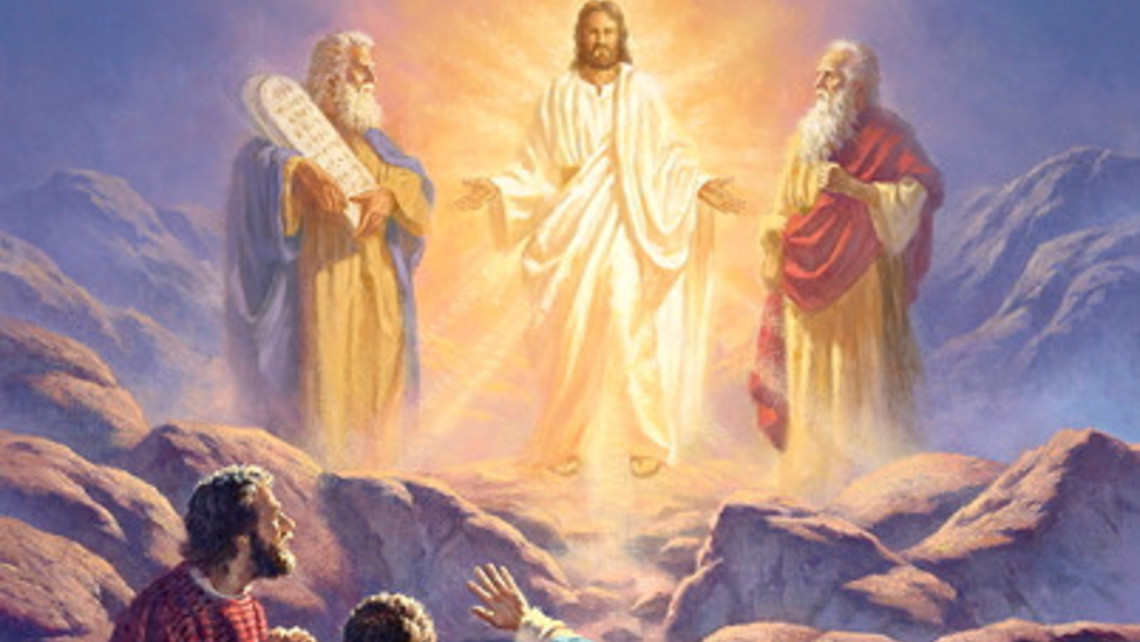Today, we embark on a journey to understand the transfiguration of Jesus. I have never heard anyone preach nor teach just what happened to Jesus atop that high place. Journey now with me as we explore the possible change in form of Jesus.
One of the most remarkable and
least understood situations in the Bible is the transfiguration of Jesus. Note
that Jesus was already made flesh (John 1:14) and was filled with the Holy
Ghost, or at least had the Holy Ghost on His Person; John the Baptist revealed
that when He baptized Jesus, “Upon whom you shall see the Spirit descending,
and remaining on Him, the same is He which baptizes with the Holy Ghost” (John
1:33).
Thereupon some saw the Spirit
descending, “The Holy Ghost descended in a bodily shape like a dove upon Him”
(Luke 3:22).
The Holy Ghost is a phantom and
is invisible, but some, including Luke, saw the Holy Ghost in the shape of a
person. He recognized the phantom of Jesus as the person, Jesus. Not only that
but Luke saw the Spirit descending like a dove in motion and remaining
on Jesus.
Luke has credibility for he was a
physician (Col 4:14), ironically a person who had the power to “make whole” (iaomai)
Note that the baptism of Jesus
added the missing substance from the man. He was made whole since He was
afterwards light, flesh and spirit.
As I have written in my book, Adoil
Come Down; Arkhas Came Undone, at the crucifixion, Adoil (Light) did come down
and Jesus came apart; the Holy Ghost departing from Him. Subsequent to the
crucifixion, Jesus was made whole in three processes, or stages : (1) His birth
of a virgin, (2) His baptism that added an invisible substance, and (3) some
other process. That other process was Jesus receiving Adoil, “Behold, a
bright cloud overshadowed them: and behold a Voice out of the cloud, which
said, ‘This is my beloved Son, in whom I am well pleased; hear you Him” (Mat
17:5).
I submit that at the
transfiguration, Adoil in the form of Light and a Cloud came down upon Jesus,
and those there beheld it. They saw the cloud if by day or the fire if by night
of tabernacle times, “So it was always the cloud covered it (the
tabernacle) by day, and the appearance of fire by night” (Num 9:16). No
wonder those who were at the transfiguration wanted to build tabernacles for
the patriarchs and Jesus. They all were the embodiment of tabernacle worship.
The Tabernacle was the Tent of
God; the place around which the Hebrews assembled. The Tabernacle was the foreshadowing
of the Christian Church, Jesus becoming the Church and His disciples the
assembly.
Note that they did not enter the
tabernacle but had their own tents facing the cloud if by day or the fire if by
night. That Fire and Cloud was Adoil, not God but His Power, as the Book of
Enoch suggests.
It seems that the ‘Transfiguration’
was Adoil coming down, or the completion of the Godhead, or Holy Trinity. It may
have been preparation for the crucifixion wherein ‘Arkhas’ came undone, the
Father leaving the Son and the Holy Ghost coming out. Of course, Arkhas, like
Adoil, is not God Himself, but processes coming about: Adoil, the Power of God,
and Arkhas, the Substances of God, as I wrote in my book.
To make whole required one
Thing from Jesus. Virtue, or in the Greek, Dynamis, “The whole multitude
sought to touch Him: for there went virtue out of Him and healed them all” (Luke
6:19). Virtue is a sort of fluid dynamics wherein goodness corrects faults as
Jesus made them whole.
The multitude therein was more
than a crowd, but many races of peoples. He made them whole, removing from each
of them their defective genetics, and consequently, they became sons of God, not
like father and son, but more like the Image of God.
There are several depositions about
the transfiguration of Jesus. Since Luke was a doctor whose vocation was to
make whole again, Luke’s account would be the scientific version of a
supernatural event. He wrote about Jesus becoming wholly God. The
transfiguration of Jesus added something to make Jesus Holy God and entirely so.
The transfiguration may very well
be ‘Adoil’ coming down, and ‘Arkhas’ coming together in preparation for
the Godhead coming apart. Hence Adoil and Arkhas would be the invisible
and visible substances — the ‘fluid dynamics’ of the Godhead in a fluidic from
— ‘Living Waters’ flowing (John 4:10).
Since Luke would have been the most
credible of the any of the apostles, his version of events follow:
After six days Jesus taketh Peter, James, and John his brother, and bringeth them up into an high mountain apart and was transfigured before them: and His face did shine as the Sun, and his raiment was white as the light. (Mat 17:1-2)
The Image of God in the beginning
was a ‘Phantom,’ or ‘Shadow’ (ibid). Perhaps the transfiguration was God
breathing life unto the Man, Jesus, to make Him a Living Soul by adding Light
to His face, just as with Adam in the beginning.
God more than breathed life unto
the nostrils of Adam but literally his face (ibid). He did the same to
Jesus, making Him the ‘Last Adam,’ to wit: “The first man Adam was made a
living soul; the last Adam was made a quickening spirit” (1 Cor 15:45). Perhaps
the transfiguration was the endowment of Jesus with the quickening Spirit of
God to make Him the Last Adam, or mankind’s last chance at life.
Jesus was not made into another
kind of being but quickened (zoopoieo) — invigorated with Power (ibid),
ostensibly from God above. If that had been thermodynamics rather than Divine
Dynamics, Spirit (Pneuma) is fluidic — fluids of a divine nature from
another realm.
Think of the transfiguration of
Jesus this way… He was pumped up with enough Virtue to heal all the nations (Rev
22:2). Likely, Jesus was imbued with all the Power of God to finish what was to
come (John 19:30).
To complete the analysis, Luke called
the transfiguration by explaining it, “The fashion of His countenance was
altered” (Luke 9:29) — His face and inward thoughts and feelings (ibid). The
nature of Jesus changed from plain to glorious.
Isaiah conveniently predicted the change; speaking of the coming Christ (the Messiah), Isaiah wrote the following:
For He shall grow up
before Him as a tender plant, and as a root out of a dry ground: He hath no
form nor comeliness; and when we shall see Him, there is no beauty that we
should desire him. He is despised and rejected of men; a man of sorrows and
acquainted with grief: and we hid as it were our faces from Him; He was
despised, and we esteemed Him not. (Isa 53:2-3)
When we think of Jesus, we think
of the face that radiates on paintings most of which were made by westerners. Jesus,
during his ministry, was surely plain and ordinary like the rest of the multitude,
but on that Holy Mountain, God glorified Jesus, making Him as handsome and
radiant as the original Adam.
We too will be transfigured in
the same fashion at our own resurrection!
The transfiguration did not last
long for Jesus because the crucifixion made his Face hideous with the Glory of
God departing from Him: “My God, my God, why have you forsaken Me? (Mat 27:46).
Just as God had glorified Jesus at the transfiguration, God forsook Him at his
impending death. The Glory of God left Jesus when it was finished. He had
morphed back, losing all the virtue that God had given Him, to save mankind!
But God is true to His Word. When
Jesus was resurrected, He again was changed. The resurrection was a permanent
transfiguration wherein Jesus regained the Glory of God and regained the Power
that He had given up.
Jesus said to Mary, “Touch Me
not; for I am not yet ascended to my Father” (John 20:17). Nobody, including
Thomas, touched Jesus after He was transformed a second time, to wit: Those who
walked with Jesus on the way to Emmaus never recognized Him. Jesus spoke of His
death and Resurrection as glorification (Luke 24:26). But after awhile it is
written, “Their eyes were opened, and they knew Him; and He vanished out of
their sight” (Luke 24:31).
The nature of Jesus had changed.
His face was not that of a man who was crucified but a glorified face. What’s
more, the flesh of Jesus was of another substance; it was His flesh but of
divine material. Jesus vanished. He had regained the Glory of God, the
same Image in which Adam was endowed — a phantom like a shadow. His new flesh
was much different than while He was in the world preaching.
He could not be touched because
His flesh was impermeable to things of the world. He had just walked through
the walls of His tomb and rolled back the stone door to reveal that He was no
longer in there. Like the walkers with Him, Jesus had appeared as the Angel of
God (Mat 28:2) who rolled back the stone. Likewise, the new substance of Jesus
merely walked into a locked room where the eleven were gathered, for “As they
thus spoke, Jesus Himself stood in the midst of them” (Luke 24:36).
Jesus was made whole at the
transfiguration, and after losing His Substances to save mankind, He was metamorphosed
again in the form of Adam who in the beginning was made glorious. Thusly, Jesus
was the ‘Last Adam’ in that He was the last glorious person who was made sin
(inglorious) for us to be like us!
How is it that you see Jesus?







